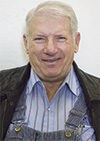Heroes are neither made nor born. For the most part, they are just ordinary people having the misfortune to be in the wrong place at the right time. Fortunately, for our society, ordinary people have extraordinary character traits.
Not just a few years back, I got a phone call telling me my wife was stuck in the snow attempting to cross the Frenchman hill on Dodson Road in the Royal City area of central Washington State. When I arrived there was another car stopped, and the occupants were attempting to push her car back onto the roadway. The group consisted of young Hispanic men, none of whom spoke any English and most were wearing sandals without any socks.
There was not a winter coat or pair of gloves among the group. They stayed until I had my pickup chained to the car and the errant vehicle pulled back on the road. All they would accept for their efforts was my best attempt (in what Spanish I knew at the time) to thank them for their kindness. Heroes? I think so.
At the Middleton high school (Idaho) in the late 1980s, an anonymous act of heroism took place. One of the students, born with physical limitations, lacked the gripping strength in his hands to lift the latch to open his locker. One of the custodians placed a simple wire loop on the door latch, and now Mitch could hook the loop with a finger and open his locker.
This worked for a number of months, and then the wire loop started to disappear. This caused a great deal of frustration since the locker needed to be accessible when there was no one around to help. No one could figure out who was removing the wire loop.
Then, as abruptly as it started, the problem stopped. The wire loop remained in place the rest of the school year. Mitch had been in the Middleton school system since first grade and was a champion to most of the locals. We found out after Mitch graduated what had happened. A pair of new kids had moved in and thought it was cute to take the wire loop from Mitch’s locker. Until one day, half of the football team happened to witness it. No adult at the high school was even informed of the cause of the problem or the cure. This was quiet, anonymous heroism at its best.
I observed a scene in the foyer of a church some time back. A single mother and her teenage son, who stood about a head taller than she, were having a rather heated discussion. A big fellow walked up and took hold of the young man by the short hair just above the back of his shirt collar. In a quiet, but very persuasive, tone of voice he said, “That’s no way to talk to a lady. Don’t you agree?”
The surprised teen managed to say “Yes.”
The big fellow went on, “I think the lady needs to hear you apologize. Don’t you agree?”
After hearing another muffled, “Yes,” the big guy said, “Let’s hear it.”
There came from the son a very appropriate apology. I was amazed at how well he could speak standing on his tiptoes. The next question was about the length of time since he last told his mother he loved her. “You are overdue,” said the big guy. “Right now is the time to tell her again.”
The teenager’s remarks up to this point had been made under duress. However, as I heard him express his love and appreciation to his mother, I thought the words came from his heart.
Then the big guy released him as he said, “This is embarrassing. What say we don’t have to have an understanding like this again?” The reply from the teenager was in the affirmative.
The big guy told me he had spoken to the mother in private a couple of days later and apologized for butting in as he had. The mother, he went on, “told me not to apologize.” Her exact words were, “You don’t know how much I appreciated you doing what you did.” PD
Tales of a Hay Hauler: How to be a Hero
BUYER'S GUIDE
VISIT OUR BUYER’S GUIDEKuhn
North America, Inc., of Brodhead, Wisconsin, is a leading innovator in
agricultural and industrial equipment. KUHN offers a broad range of hay
and forage, livestock, and crop production tools, as well as landscape
and road maintenance equ...
Alfalfa Partners and Sorghum Partners are brands of S&W Seed Company. Alfalfa Partners® is dedicated to helping our customers in optimizing their alfalfa production systems to obtain maximum yields and financial success. The Sorghum Partners® ...
-
LATEST NEWS
-
-
-
-
March 2024 new product rollout
March 5, 2024
-










